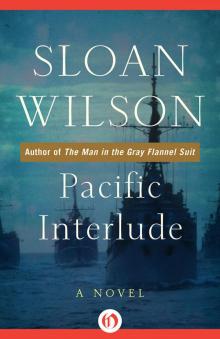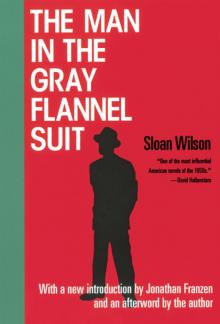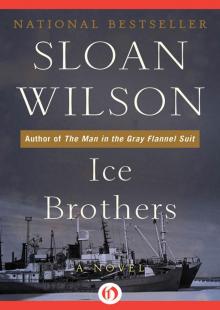- Home
- Sloan Wilson
Ice Brothers Page 25
Ice Brothers Read online
Page 25
In the midst of all these, as he realized, rather pompous philosophical musings, Paul was interrupted by Cookie, who loudly promised to shit in Boats’s soup if that worthy didn’t back up his authority over the seamen who were assigned to galley chores.
“When I say a man should be punished for doing a lousy job, Boats should do something to him. He just put a damn sailor who can’t even get a plate clean, up for promotion!”
“What’s the man’s name?”
“Blake. He breaks more dishes than he washes. He does it on purpose to get out of the galley.”
“Tell Blake and all the others that they’ll need your recommendation for any promotion.”
“Aye, aye, sir!” Cookie said, touching his chef’s hat with his forefinger, and happily returned to his galley.
Back to reality, hero, Paul told himself.
CHAPTER 23
The gale let up two days before they reached Narsarssuak Fjord. The sky cleared and Paul was able to pinpoint his position before he entered the ice pack. When the mountains of Greenland came into sight, he recognized the peculiar formation of the granite hills at the entrance to the fjord.
“Narsarssuak Fjord dead ahead, distance sixty-three miles,” he reported to Mowrey, who staggered out of his bunk to verify this news. After staring at the distant coast for a few moments, he said, “You would have saved thirty miles if you had cut closer to the coast sooner.”
At Paul’s direction Nathan coded a message which gave their position to GreenPat and their estimated time of arrival at the base. After Sparks had sent it, he was told to stand by. While he waited, the crew speculated on the possibility of a change of orders.
“We can’t go far without getting fuel,” the chief machinist’s mate said to Paul. “You better tell them that if they forget it.”
After only a short wait GreenPat sent a short message which, in accordance with Mowrey’s standing orders, Sparks kept the operator repeating until Nathan had decoded it.
“Proceed to Narsarssuak Fjord,” GreenPat ordered. “Render all possible assistance to DD 177, which is hard aground on southern side of entrance to fjord. Navy tanker Greenwood is standing by to take destroyer’s fuel and personnel if necessary. After rendering all possible assistance, continue to this base for refueling, supplies and orders as previously given.”
“Nothing I like better than pulling the damn navy off the rocks,” Mowrey said when Paul gave him the message. “What the hell would all those admirals do without the Coast Guard to nurse them?”
He climbed out of his bunk, called for coffee, and began to put on his best uniform. Navy discomfort was clearly a tonic.
To Paul’s mind, a destroyer was a big ship, three times the length of the Arluk, and more than ten times the tonnage. Studying the entrance to the fjord as they approached, he half expected this huge vessel to be blocking half the entrance. To his surprise he saw nothing, even when they were only a few miles away. It was Mowrey who finally spotted the destroyer, which looked like a tiny model of a ship at the base of a towering cliff. She was almost on an even keel with her bow pointed out to sea, and at first glance it looked as though she were simply steaming very close to shore. A small plume of smoke reached up from her stack. The radar crescent at her masthead turned slowly toward them.
“She’s on the rocks in practically no water at all,” Mowrey said with satisfaction as he studied the chart. “Her damn radar didn’t do her much good.”
“How the hell did she get in there?” Paul asked. “How did she go ashore sideways?”
“Probably she was anchored in what looked like a nice safe spot right inside the fjord, and a good foehn wind hit her. Those navy bastards never take the trouble to learn about Greenland.” Mowrey continued to study the ship through the binoculars as they came nearer. “Her port anchor is still out,” he said. “They probably dragged ashore before they knew what hit them.”
A small navy tanker was anchored a half mile from the destroyer. Both it and the destroyer started to blink signal lights at the same time.
“Flags, get the tin can first,” Mowrey said.
“I’ll get the tanker,” Nathan added and went to the signal light on the other side of the bridge. He could read blinker lights even faster than Flags could, a fact which rather confused Mowrey. For about two minutes the lights on the three ships flashed rapidly.
“The tanker wanted identification and then said she had taken most of the fuel off the can and was standing by to take personnel when ordered,” Nathan reported.
“The can requests a tow,” Flags said. “She says her stern is hard aground, but her bow is free. She’s lost use of her propellers and rudder but otherwise has power. Her captain says there is good possibility we might tow her free.”
To Paul this seemed unduly optimistic. When he studied the waterline of the vessel, he saw that the stern was propped higher than the bow, and the ship was canted slightly to starboard, indicating that the whole port side was aground. The still gray waters of the fjord turned brown just short of the destroyer, with several areas of a lighter brown surrounding her. Over one of these a gentle swell broke, revealing rocks. The destroyer had been swept right over a reef, perhaps when the tide was higher, and Paul wondered whether she had any bottom left.
Mowrey was at his chart table, thumbing the tide tables. “The tide’s on its way up now,” he said. “It will crest in about two hours. Yale, take the boat and go in there. Find out how they went aground and how long they’ve been there. Get a detailed damage report—I don’t want her sinking the minute I get her off. Find if they’ve tried kedging her—her anchor is still out. The skipper is probably a commander and he’ll want to be in charge of this operation. Find out exactly what he wants us to do and tell him that if we follow his plan, it’s his responsibility. While you’re talking to him, have Boats take soundings everywhere between us and him. I want to know where the water is and where it ain’t. Have him draw up a rough chart, at least a sketch.”
The spectacle of a much prouder ship in trouble and the possibility of rescuing her perked up the crew of the Arluk, and while Mowrey let the trawler lie dead in the water, they worked with a will to lower the whaleboat. Boats jumped aboard with three seamen carrying leadlines and a clipboard with paper for a sketch. Paul followed.
“Study the currents in there,” Mowrey said, leaning over the rail as they cast off. “Not much is running here, but sometimes it’s stronger along the shore.”
“Aye, aye, sir,” Paul said. It seemed obvious to him that Mowrey much wanted to visit the stricken destroyer himself and to talk with her disgraced captain, but he was probably aware that his red eyes, swollen face and trembling hands would not make a good impression. Groundings were always investigated, along with rescue attempts, and Mowrey was beginning to recognize his vulnerability.
As the whaleboat approached the destroyer, a crew of seamen rigged a boarding ladder at the waist of the ship. It was very spiffy, Paul saw as they came alongside: gleaming mahogany, new white rubber with a nonskid surface on the steps, polished chromium stanchions with hand ropes of soft white cotton handsomely spliced. As Paul climbed it, he saw that the decks looked like those of a brand new ship. Everything was freshly painted, and spotless gray canvas covers with snowy laces covered the big guns which bristled everywhere. God, if we only had guns like these aboard our ship, I couldn’t wait to meet the Germans, Paul thought.
Three petty officers, a lieutenant and a lieutenant commander formed a welcoming committee to greet Paul. All wore faultlessly pressed uniforms—aboard the trawler Paul had forgotten what pressing did for clothes. The gold stripes and the insignia of the officers gleamed without tarnish. The lieutenant even wore gray suede gloves. Paul, who had slept in his uniform the preceding two nights, felt like a tramp as he climbed aboard and self-consciously saluted the quarterdeck. “Permission to come aboard, sir?”
“Permission granted,” the lieutenant commander said. “We’re glad to see you, althoug
h I don’t know what you can do. Could you come to my office?”
Paul followed him through a passage, across a wardroom that looked to him like the drawingroom of a palace, with a huge silver coffee tureen on a special shelf and a table as big as two pool tables. The office, with a sign saying EXECUTIVE OFFICER in gold letters on the door, resembled the office of a vice president of a large corporation. The tall, slender executive officer, who looked surprisingly young when he took his cap off, but every inch a patrician, sat in a swivel chair behind an empty desk, and motioned Paul toward a small leather armchair nearby.
“Coffee?”
“Not right now, sir.”
“I suppose you wonder how we got in this fix.”
“Yes, sir.”
“We were escorting a small convoy of troop ships to the mouth of the fjord. We were supposed to turn away before entering the ice pack, but there didn’t seem to be much ice.”
“That wind broke it up, sir.”
“So we understood. This was yesterday, not much more than twenty-four hours ago. God, it seems like years! The visibility was fine,” the exec continued in an oddly detached voice. “We can’t blame low visibility. We were just about six miles offshore and were planning to make our turn when it happened. We hit a growler, but nobody saw it until it bobbed up astern. We sure heard it, though. It took out both our starboard screws and one of our rudders. The damn thing wasn’t much bigger than a small whale. The radar never picked it up and neither did the sonar. It wasn’t deep enough for the sonar or high enough for the radar, I guess. Just a little cake of ice, so low and so much the color of the water that nobody saw it.”
“We’ve almost hit more than one of them,” Paul said.
“I never saw one like that before, ice so blue it was almost black, and so hard that our screws didn’t even smash it. Anyway, it took our starboard screws and starboard rudder. We limped in here to anchor and see if we could make repairs, or wait for a tow. We let go the hook in twenty fathoms and the chart gave us good water for a mile all around. There wasn’t any wind at all and the sky was clear, except for a gray overcast. We were enough inside that point to get shelter if the wind blew into the fjord, and with those mountains all around, it looked safe as a lake. The water was like a mirror when I turned in.”
“But all of a sudden the wind hit you like an express train,” Paul said.
“Did it hit you too?”
“Not here. We were too far out, but I’ve seen it. They call it a foehn wind. It just happens near shore.” Paul blushed inwardly over his instant expertise, thanks to Mowrey.
“Jesus, I couldn’t believe it. With our starboard screws out, we couldn’t maneuver worth a damn. It wasn’t exactly dark, but so much water was flying that we couldn’t see anything. The anchor dragged even when we gave it all the chain we had. We dropped more anchors and they all dragged. The wind was circular—a regular tornado. While we were steaming to try to take the strain off the anchors, it suddenly twisted us right around and we got the chain fouled in our port screws. That frosted it. The wind just blew us ashore sideways and there wasn’t a damn thing we could do.”
“I can understand that.”
“All the screws and rudders are gone now. We’re holed aft. She has a double bottom and it’s hard to tell exactly how much damage has been done, but she’s wedged so firmly in the rocks that the tide doesn’t affect us a damn bit. Low tide almost gave us a chance to inspect her bottom, but it didn’t drop enough for that. It must have been about halftide when we hit, but that damn wind had flooded this side of the fjord.
“I never even read about anything like it, this foehn wind. We must have been thrown up on some kind of a rock shelf. On our stern we’ve got eight feet of water on our port side, about twenty-five feet on our starboard side right now. As you go forward, it gets deeper on both sides. I figure the after half of the ship is hard aground. If it were a smooth shelf, you might jolt her off, but I have an idea there’s nothing smooth about it. It could be just an accumulation of big boulders that have fallen from those cliffs up there.”
“Seems likely.”
“To be honest, I don’t think we have a chance in hell of getting her off, not even if we had a dozen deep sea tugs, but for the record, we have to try.”
“Yes, sir. My captain wants me to talk to your skipper about taking responsibility and other details. May I see him?”
The executive officer looked embarrassed. “To tell the truth, our skipper is taking this kind of hard. As you can guess, he had a rough night. He’s just turned in and I hate to wake him up.”
“I can understand that, but who’s going to be in charge of the towing operation?”
“Us of course. I’ve got a big wire cable all ready on the forecastle. You can run a light line out with your boat and winch the big cable to your ship.”
“Do you have any anchors out?”
“The starboard chain parted when it fouled our screw, and believe it or not, our winch jammed. Everything went wrong at the same time. The men are already rousting in what’s left of the chain.”
“My skipper wants me to tell him in some detail about the damage.”
“Come on, and I’ll take you on an inspection tour.”
Paul couldn’t believe the luxury and the formality of this brand new destroyer. Below decks there was nothing to indicate that she was on the rocks. Probably permanently. Soft music was playing from concealed speakers in almost every compartment. “The Blue Danube” was followed by “Smoke Gets in Your Eyes.” The bulkheads were painted in soft pastel colors. At a soda fountain in a corner of the enlisted men’s mess, a half dozen men were all faultlessly dressed, and there wasn’t an unshined shoe anywhere. Paul had never before seen so much military etiquette. Unless enlisted men were eating or working, they snapped to attention whenever an officer passed. Apparently no one shouted aboard this ship. All the voices were low and respectful.
The immaculate lieutenant commander took Paul to the engineroom, where he stood surrounded by gleaming metal and white bulkheads which no smear of oil or grease defaced. The engineer, another lieutenant commander in a natty uniform, showed him a framed diagram of the ship about four feet long which had been inked in many colors. Pointing to various sections with a manicured finger, he described the wounds of the dying ship in detail.
“Smoke Gets in Your Eyes” ended on a high note and “Stardust” began.
After Paul had gathered all the information he could he went on deck and waited for his whaleboat, which was completing its soundings. A crew had taken the coverings off double five-inch guns, and was polishing them. They were beautiful pieces of lethal machinery which looked capable of blasting any German icebreaker out of the sea. Except they were stuck here.
As soon as Paul glanced at the sketch which Boats had prepared to show the depth of water around the destroyer, he knew that the sleek ship had had it. Apparently the gale and the surging seas had picked the destroyer up and dropped her not only on a granite shelf, but in the midst of a whole nest of rocky shoals. He showed the clipboard to the executive officer.
“We sent our boats out for soundings and they came back with just about the same results,” he said. “Our skipper feels there’s a chance of snaking us out along this route.” He traced a channel with his forefinger which looked obviously too narrow and too crooked. With a rather embarrassed smile he added, “I guess we should give it the college try, anyway. For the record …”
“Yes, sir.”
“We’ve notified navy salvage in Boston. They’re pretty busy these days but if they could get some salvage tugs up here and maybe some devices to float her higher … The skipper is afraid we may not have much time. If we got another gale, or if a shift of wind brought the ice floe in here, there might not be much left to salvage. So he hopes you’ll give it everything you’ve got.”
“We’ll try,” Paul said, and saluted both the executive officer and the quarterdeck before descending the ladder to his boat. T
hey towed a long light line to the trawler for pulling out the cable.
Mowrey was waiting for Paul on the bridge of the Arluk. He apparently was trying his best to pull himself together, and was drinking coffee with no odor of booze. Still, his hand shook as he held the clipboard with Boats’s sketch and he seemed to have difficulty concentrating on the details of the operation which Paul gave to him.
“Well, I’d say we have about one chance in a hundred of doing any good, but let’s get going,” he finally said. “Tell Farmer I want a bridle rigged for the tow cable. Use our heaviest hawsers. And take those depth charges off the racks on the stern. Stow them in the hold.”
The deck force worked energetically, and if one was not convinced that the whole exercise was hopeless, as Paul was, it all started out as highly efficient. Mowrey became his old self as he shouted instructions from the wing of the bridge and actually seemed to be enjoying the activity.
It took more than two hours to get everything ready for the towing to begin. Gradually the trawler took a strain. The heavy steel cable rose from the sea and became an arc connecting the two ships. Slowly Mowrey increased the revolution of the big screw and the arc became a straight line. The heavy manila bridle stretched and water was squeezed from it. Farmer yelled at three seamen who were standing on the fantail watching it.
“Get back, you crazy bastards!” he yelled. “That thing can break anytime.”
Never before had Paul heard the old fisherman use anything approaching profanity. His warning was timely, because the bridle soon did break at the point where it had been attached to the cable. The heavy manila snapped back like a giant rubber band, and any men standing near it would have been cut in half.

 A Summer Place
A Summer Place Pacific Interlude
Pacific Interlude Man in the Gray Flannel Suit
Man in the Gray Flannel Suit Ice Brothers
Ice Brothers